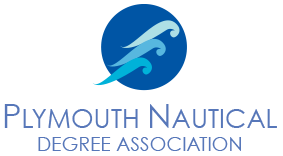World Maritime Day -Joint Meeting Held
- November 21, 2018
This was the 11th Celebration of World Maritime Day organised by the South West of England Branch of the Nautical Institute, supported by the Devon and Cornwall Joint Branch of IMarEST and RINA and the University of Plymouth’s Marine Institute.
Keynote speaker Richard Clayton was then introduced. Richard who trained as a shipbroker, gained a Master of Science in International Shipping at the University of Plymouth. Richard’s first job after leaving Plymouth was commercial reporter for ‘Fairplay International’, becoming editor in 2007. Today Richard is Chief Correspondent at Lloyd’s List where he writes thought provoking analytical insight pieces.
Richard’s opening comments described his early experiences as a student at the University of Plymouth, or as it was then Plymouth Polytechnic. He stated that he became totally absorbed in the maritime world finding it the ‘most stimulating, exasperating, challenging and engaging industry anywhere’.
In considering his approach to the talk he commented that the theme ‘Our Heritage, Better Shipping for a Better Future’ could simply focus on the word ‘better’ and that discussion could be developed on whether better shipping leads to a better future?
Keynote speaker Richard Clayton was then introduced. Richard who trained as a shipbroker, gained a Master of Science in International Shipping at the University of Plymouth. Richard’s first job after leaving Plymouth was commercial reporter for ‘Fairplay International’, becoming editor in 2007. Today Richard is Chief Correspondent at Lloyd’s List where he writes thought provoking analytical insight pieces.
Richard’s opening comments described his early experiences as a student at the University of Plymouth, or as it was then Plymouth Polytechnic. He stated that he became totally absorbed in the maritime world finding it the ‘most stimulating, exasperating, challenging and engaging industry anywhere’.
In considering his approach to the talk he commented that the theme ‘Our Heritage, Better Shipping for a Better Future’ could simply focus on the word ‘better’ and that discussion could be developed on whether better shipping leads to a better future?
However, Richard considered that it might be more useful to share conclusions reached from a CEO Round table he had chaired at the SMM Exhibition in Hamburg in September. The organisers had asked him to lead on how dirty old shipping could fit into the clean, smart and sustainable world of the future.
This led to questions about the meaning of sustainability. Shipowners used to view sustainability as adherence to Corporate Social Responsibility and Quality Management. However, sustainability should be viewed from other perspectives. For example, it may be concerned with the need to mitigate climate change by aligning maritime with the logistics sector to reduce total emissions.
Richard suggested that better shipping could be described as more efficient shipping. At a Business Briefing, which he also chaired at SMM, it was recognised that efficiency has three elements – technology, regulation and human resources. He suggested that this leads to three questions; How is next generation technology being developed with people in mind? How are regulations addressing the future needs of technology? How are human resource experts ensuring at least the minimum levels of skill needed for the future?
He went on to suggest that better shipping will encompass next generation technology. Richard also stated that a vital role for maritime regulation is to help meet the need of a sustainable society while providing room for commercial return. “If shipping is not profitable then shipowners will find it difficult to invest in technology which enables compliance with regulatory requirement”.
Richard stated there is insufficient communication between those involved in the three elements of technology, regulation and human resources. There tends to be a ’silo’ mentality in which knowledge is often only shared on a ‘need to know basis’. Getting to a state of ‘better shipping’ must recognise the significance of good communications between different disciplines.
No part of the shipping industry can exist in a vacuum. The key to better shipping is ‘partnership’. Partnership means interaction between different overlapping elements, that silo thinking is breached and that there’s a recognition that not all skills are held in-house.
Through his activities Richard senses that within the shipping industry there is enthusiasm for forming a series of non-binding partnerships to gain access to skills without the cost of buying a company. He had observed that the millennials show interest in problem solving and tend to ignore traditional divisions, whereas any new work ethic tends to be a challenge for older employees.
In his conclusion he stated that the IMO’s determination to push for better shipping is correct, but the better future does not lie on a distant horizon – it is now!
Following Richard’s talk the Deputy Lord Mayor of Plymouth Cllr Christopher Mavin made a brief comment about the future marine and maritime opportunities being offered at Plymouth. He described the exciting development taking place at ‘Oceangates’, a maritime industrial park located in the former South Yard of Devonport Naval Dockyard.

 Copyright © 2025
Copyright © 2025